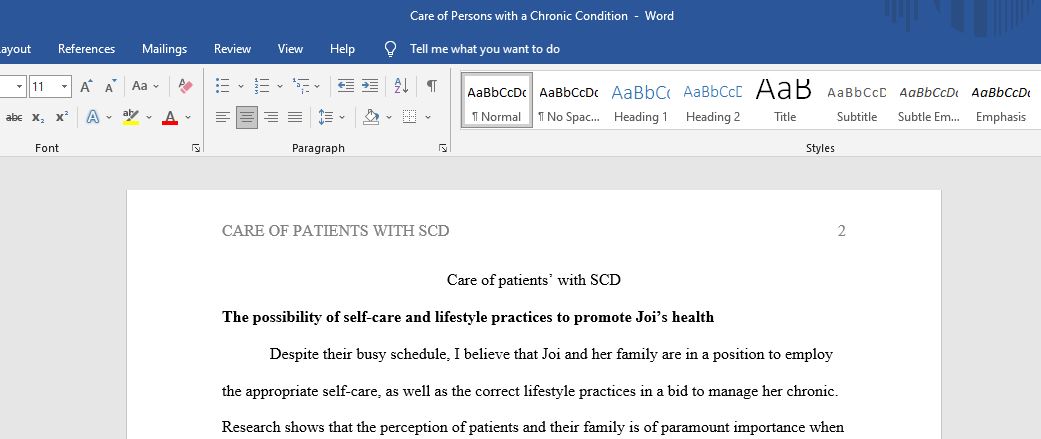Care of Persons with a Chronic Condition.
Case Study of Joi Anderson
Joi Anderson, a sixteen-year-old female, arrives at the Emergency Department (ED) with her
grandmother Sharyn complaining of bilateral thigh and hip pain. This pain has been present for one
day and is steadily increasing in severity. Paracetamol and Ibuprofen have not relieved her
symptoms. Sharyn denies Joi has had any recent trauma and states she hasn’t partaken in any
excessive exercise. Joi reports feeling “tired all the time”, breathless and that “it hurts when I go to
the toilet to wee”. When asked if she has needed to go to the toilet more often, she replies yes.
Sharyn also reports that Joi has had similar pain to this before which required hospitalisation when
Joi was four and was diagnosed with sickle cell anaemia. Joi sees a haematologist once every one to
two years for check-ups and has not required further treatment. No one in Joi’s family has had
similar complaints. Sharyn explains that Joi’s father, Ben, is a fly-in-fly-out (FIFO) worker and has just
returned to work for the next four weeks. Joi’s mother, Chloe, works long hours, so Sharyn lives
with them to help with Joi’s cares.
Medical Past History:
Sickle cell anaemia – diagnosed aged 4, controlled since the age of 6.
Medications:
Nil.
Allergies:
Nil.
On examination:
• Temperature 37.5 °C
• Orientated to person time and place (GCS 15)
• Conjunctiva and mucosal membranes slightly pale in colour
• Capillary refill sluggish (5 seconds).
• Nonspecific bilateral anterior thigh pain with no abnormalities detected, pain score 3/10
• All other findings within normal limits
Task Summary
For this assessment, you are required to present your personal and reflective beliefs, values and
attitudes in a reflective piece of 1000 words. You will reflect on how these beliefs, values and
attitudes influence your approach to patient interactions and the nursing care you provide to
patients. Furthermore, your learning and personal growth will be reflected upon and how such
growth will influence future provision of care for patients experiencing chronic conditions.
For this individual assessment, you have been given a hypothetical case study of a patient suffering
from a chronic condition (see Appendix 1B). Further information has been added to this case study
for this assessment task.
CPC105_Assessment_1_PartB_Brief_Reflective piece_Module Due4.1 Page 2 of 6
Context
This assessment task aims to develop your understanding of the key influences on the provision of
nursing care and the care planning of patients with chronic conditions. It sets out to illustrate the
professional and personal dilemmas registered nurses can face when developing therapeutic
relationships with patients and delivering nursing care. Person‐centred care and the involvement of
family members is also considered in this assessment task along with self‐care abilities of patients
and families. The case study of Joi Anderson has been extended and will be used in this reflective
writing piece.
This assessment task provides you the opportunity to communicate your beliefs, values and
attitudes, challenge such thinking and to discover ways in which you can provide person‐centred
care to all patients, irrespective of social, cultural, religious, and/or political views. It is through such
reflective thinking that you learn from your experiences, build upon them and become a competent
registered nurse.
Task Instructions
You are required to reflect upon and analyse your own beliefs, values and attitudes and the
influence these may have on the nursing care you provide to your patients with chronic illnesses. In
reflective writing style and in 1000 words, consider the following:
1. Do you believe Joi and her family are able to engage in self‐care and lifestyle practices that
promote her chronic health condition? Are there any religious or chronic disease barriers
to this engagement in self‐care? Explain your answer.
2. Reflect on how your beliefs, values and attitudes might affect the development of a
therapeutic relationship with Joi and her family and the implementation of person‐centred
care.
3. How will your respect for Joi and her family’s choices and lifestyle impact the nursing care
provided to Joi?
4. Has completing this assessment changed, broadened, or challenged your beliefs and
attitudes? Explain your answer?
5. Identify how you can use this learning in relation to the provision of nursing care and care
planning for patients with chronic conditions

word limit:1067
